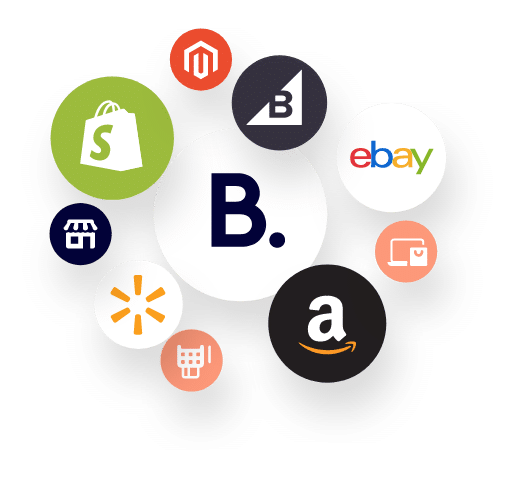4 Best Skuvault Alternatives for Merchants
Mid-size and large e-commerce brands seeking to automate their supply chain should look for a system that can scale easily. If you are juggling multiple sales channels, multiple inventory locations, selling both online and offline, or selling DTC alongside wholesaling, you can quickly outgrow a standalone inventory management system. And you need the capability to automate various operations such as order fulfillment procedures.
A solution that can incorporate inventory, order, and warehouse management with demand forecasting, a powerful API, accounting, reporting, purchasing, and even point of sale (PoS) will provide your omnichannel enterprise with better efficiency and scalability.
And if you want to automate your critical operations to gain extra efficiency, you might look for an operating system that offers workflow automation functionality, including purchase order automation, automated order fulfillment, invoicing, inventory allocation etc..
We’ve listed four Skuvault alternatives that encapsulate these features most effectively. For full information, visit websites and their social media.
1. Brightpearl
Brightpearl is a retail-tailored operating system. It’s designed with omnichannel selling in mind. Brightpearl offers an integrated management solution that is more specialized than conventional platforms. As a system built for retail, there is no need to pay for unnecessary functionalities or expensive customizations.
Brightpearl combines inventory, sales order, warehouse management, accounting, point of sale (POS), supply management, fulfillment and reporting capabilities, all in one single system. Some of Brightpearl’s core features include:
Integrated warehouse management system
Brightpearl’s WMS allows you to barcode scan products when receiving goods, creating and processing returns and transfers, or counting inventory. Staff receive a warning when there is an invalid selection or incorrect item. This minimizes errors and prevents customers from receiving wrong items. It also makes kitting or creating bundles much easier.
It also offers flexible pick and pack processes. You can pick between the FIFO model of inventory allocation and alternatives for a more agile pick and pack process. This reduces the time that inventory packing takes, thus freeing up your team for other more complex tasks.
When it comes to returns, Brightpearl’s WMS enables hassle-free returns. This means when a customer returns products to you, the sales credit process initiates as soon as returns are received by your warehouse.
Robust integrations
Uniquely, Brightpearl adds value to your business through integrations with world-class EDI providers, marketplaces, shipping services, and more. Brightpearl pride themselves on their native high performance integrations with major marketplaces and ecommerce platforms, such as Amazon, eBay, Shopify, BigCommerce, and Magento.
They also have a trusted integration partners network and deep API that allows you to connect Brightpearl to any best-in-breed technology solutions. So you don’t need to worry about your operating system holding you back when your business expands rapidly.

Smart workflow automation
All omnichannel retailers must handle a series of critical post-purchase operations and how efficient you are on these operations impacts dramatically on your customer experience. Most of the operations demand close attention and can be overwhelming when handled manually, like handling order spikes in peak seasons, fulfilling products from multiple channels, allocating inventory to different locations, offering next-day delivery, managing suppliers or customers. That can make them the main bottleneck to your growth if done manually.
Brightpearl’s Automation Engine gives you the freedom to automate all these critical operations based on your own workflows. For instance, you can automatically dropship products from a certain sales channel like Shopify, fulfill orders from the closest warehouse to the delivery address, automatically invoice when an order is fully paid, or even automatically add a free gift to your VIP customers’ orders. You can save a substantial amount of time by automating your order to cash workflow and reduce manual errors.
Software with services
In addition, Brightpearl offers comprehensive services from implementation and onboarding training to 24/7 technical support and ongoing business consulting. A cloud ERP system purchased through a third-party reseller can mean implementation and training are unreliable and hard to come by. Also, you often need to pay for extra support to resellers.
Integrated retail accounting
Brightpearl’s integrated retail accounting offers you real-time visibility on your financials and provides useful features like landed-cost and multi-currency that gives you an accurate view of your costs. If you prefer to use a third-party accounting tool, no problem. Brightpearl also seamlessly integrates to popular accounting softwares like QuickBooks, Xero, etc.
2. Ecomdash
Ecomdash is an inventory management and order management system for SMBs selling across multiple channels. It is ideally suited to small companies that deal with a low volume of orders, below 10,000 a month and a simple order processing workflow.. For larger companies with a more sophisticated workaround, and those needing a system that goes beyond inventory and order management, customers should look elsewhere at what’s offered by other Skuvault competitors
This Skuvault alternative’s pricing begins at $25 per month for businesses with fewer than one hundred sales. However, you may end up paying much more by adding extra integrations as Ecomdash itself provides very limited features. User reviews highlight that Ecomdash often can’t deliver all the features mentioned on its website, and data sync is not real-time.
Particular issues with the software include:
- Additional integrations are needed
- Overpromise and underdeliver
- Low inventory data sync frequency
- Difficult to use interface, especially on mobile devices in iOS and Android
- Lacking advanced reporting features
- Customer service support is not 24/7
- Lack of advanced features
3. Fishbowl
Fishbowl is a desktop rather than a cloud-based inventory management solution and is designed for small businesses. Its inventory-management and manufacturing features are separated between two platforms, ‘Fishbowl Warehouse’ and ‘Fishbowl Manufacturing’. It is not an integrated all-in-one service.
Fishbowl does not operate a subscription-based pricing plan so users must pay upfront and provide an additional fee for updates, training, and support when they are required.
Concerns with Fishbowl include:
- Needs in-house IT resources as it runs on your own servers
- Difficult to use interface
- Limited reporting options
4. Cin7
Cin7 is an inventory management system that connects your workflows for orders, inventory, shipping, and accounting into one automated solution. User reviews comment on the positive onboarding experience, but mention that customer service can be hit-and-miss after that.
Like its rivals, Netsuite and Zoho, it provides a general service that is not specifically tailored to retail and wholesale companies. And it’s not so great at handling high order volume. If you’re a growing ecommerce business looking for the best Skuvault competitor, Brightpearl proves a more sophisticated choice.
Although it has plenty of features and integrations, user reviews criticize Cin7’s interface and complex configuration options as being particularly difficult to use.
Other drawbacks of using the system include:
- Expensive plans
- Overly complex dashboard with too many features
- Difficult and slow integration process
Why choose a Skuvault alternative?
Skuvault is a standalone inventory management system that caters to medium-sized or small businesses (SMB). For larger companies, those that are retail or ecommerce-based, Skuvault may fall short of advanced features to support more complex workflows.
One way to overcome this may be to look into the available Skuvault integrations:
Skuvault integrations
Skuvault integrations as standard include marketplace apps such as:
- Amazon
- eBay
- Etsy
- Salesforce
Channel management integrations like:
- GeekSeller
- sellbrite
- SellerActive
- Zentail
And for point of sale integrations, your options are:
- Shopify POS
- Square
- Lightspeed
The need to string together integrations for full functionality aside, consider the following further reasons why Skuvault may not be the right solution for you.
You want to speed up your operations with automation
E-commerce inventory management software can improve the efficiency of inventory control processes by connecting your online sales channels with your inventory locations. However, if you want to speed up your pick, pack and ship processes—from barcoding to warehousing, and everything in between—you need to consider an operating system with workflow automation functionality. So you can automate critical order processing tasks and optimize warehouse management processes.
Although Skuvault offers some automatic features, like automatically updating inventory across your ecommerce channels and hyper picking, it doesn’t allow you to set up rules to automate the pick, pack and ship processes based on your own workflows. For instance, you won’t be able to automatically pick the closest warehouse to the delivery address for an order fulfillment.
You need to integrate accounting features
For any retailer or online business, keeping track of your finances is essential for a healthy cash flow and future growth. Skuvault has some basic accounting-related features and provides integrations with QuickBooks and Zudello. But it doesn’t offer complete integrated accounting.
If you want more in-depth financial reports or accounting-related features like invoicing, you may need to consider Skuvault alternatives that offer a real-time accounting module through your various sales channels. Automating your accounting procedures by creating journals automatically, from the point of purchase to shipment, will provide your business with the best information with which to make budgetary decisions.
Connecting your warehouse operations with accounting procedures can help to maximize your sales with accurate forecasting and detailed reporting.
You want a seamless WMS
For some larger enterprises, it’s very common to integrate a standalone warehouse management system like Skuvault with a cloud ERP. However, it can often lead to longer implementation time, extra customization fees, and potential disconnected data.
Depending on your business requirements, it might be more cost-effective and efficient to go for a retail-tailored operating system from Skuvault competitors that work like an ERP with optimized functionality for retail and wholesale.
Integrating a separate WMS with your ERP, plus order management software and various ecommerce platforms is costly in both time and money. In addition, it will require constant maintenance as ERPs are usually code-heavy when it comes to system updates. An operating system that incorporates warehouse management software within an omnichannel retail management system is the most cost-effective way to automate your sales operations.
You want easy access to your data
Skuvault’s inventory management software can simplify your inventory control workflow, but it does not offer the convenience of centralizing all your business data in one place. If you want to run your business in a data-driven way, you might consider a system where you can have all the operational data in one place, from inventory and sales to suppliers’ and customers’ data.
You want flexible order fulfillment options
Order fulfillment is one of the most critical contributors to your customer experience, as nowadays customers want their orders delivered fast and accurately.
However, it’s challenging when fulfilling orders across multiple channels and allocating inventory from multiple warehouses. Skuvault might not be in the right place to meet your complex order fulfillment workflows across multichannel and multi inventory locations, especially when your order volumes are high.
“The existing set up we had – which was based around Skuvault for inventory management plus lots of spreadsheets – was cumbersome and inefficient,” said Jordan Kavuma, Director of Marketing at Prima Coffee.

Frequently asked questions
Who uses Skuvault?
Skuvault targets customers looking for an ecommerce inventory management system. It is geared towards small and mid-size retailers. Larger companies and those looking for a retail-focused and integrated WMS should consider Skuvault competitors. Those mentioned above—and especially Brightpearl—are good options, but others such as Shipstation and Woocommerce also exist as Skuvault alternatives.
What is the relationship between inventory and customer service?
Well-managed inventories maximize customer satisfaction. An automated system limits human error, ensuring you send the right products and in the fastest time possible. A successful delivery is one step towards repeat purchases, successful CRM, and happy customers.
What is the importance of inventory holding from a customer service perspective?
One of the priorities of inventory holding is to ensure your business can meet its customer service targets. Managing your inventory in line with fluctuating customer service demands will help you to maintain profitability. A WMS stays on top of real-time inventory data to forecast future needs with accuracy.
